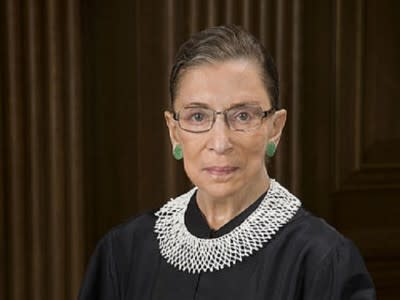At 80, Justice Ginsburg emerges as the court’s new originalist
Doug Kendall and Mei-Wah Lee from the Constitutional Accountability Center discuss Justice Ruth Bader Ginsburg’s role as the originalist foil to Antonin Scalia on the Supreme Court.
In the years before his retirement from the Supreme Court, Justice John Paul Stevens emerged as Justice Antonin Scalia’s primary antagonist in debates surrounding the Constitution’s original meaning. In a series of cases over the course of his last decade on the bench, Justice Stevens authored lengthy, passionate, originalist responses to Justice Scalia’s account on a broad range of significant legal issues, most notably on the First Amendment in Citizens United v. Federal Elections Commission and the second Amendment in District of Columbia v. Heller.
Upon Justice Stevens’s retirement in June 2010, many wondered who among the Court’s liberal faction might assume his role and continue to challenge Justice Scalia with text-and-history-based counter-arguments. After blockbuster cases on health care and voting rights, it’s become clear that Justice Ruth Bader Ginsburg has taken over that originalist mantle.
In the three terms since Justice Stevens’s departure, the Supreme Court’s docket has been packed with hot-button cases that have garnered national interest. With the Court thrust into the forefront of the national consciousness, it’s become even more critical for there to be a progressive counterweight to the conservative account of the text and history of our Constitution. It was, therefore, a relief to hear Justice Ginsburg declare at a panel discussion: “I count myself an originalist too.” It was to some a surprising declaration, but one that she has lived up to, as best reflected in her opinions for the Court’s progressive wing in NFIB v. Sebelius, last Term’s challenge to the Affordable Care Act, and Shelby County v. Holder, this past Term’s challenge to the Voting Rights Act.
When the Supreme Court upheld the Affordable Care Act last year, most Court watchers were gripped by the conservative saga involving Chief Justice John Roberts, who sided with the Court’s liberal wing in upholding most of the Act. Much less noticed but perhaps equally significant, however, was Justice Ginsburg’s text-and-history-based concurring opinion. Central in Justice Ginsburg’s defense of the Act was Resolution VI, a vitally important, but completely lost, part of our nation’s founding history. The Resolution, which Constitutional Accountability Center had relied heavily upon in each of its six briefs in the various cases challenging the Affordable Care Act, was passed by the delegates to the Constitutional Convention in Philadelphia in 1787 to guide the Convention’s “Committee of Detail” – the body tasked with writing the Constitution’s actual language, including the federal government’s powers enumerated in Article I, Section 8.
The Resolution instructed the Committee that Congress was to have the power to enact laws “in all Cases for the general Interests of the Union, and also in those Cases to which the States are separately incompetent . . .” Although Resolution VI is a critical piece of our Founding history and essential in the debate over the powers of the federal government, it had not been cited in any opinion by any Justice on the Supreme Court. That is, until Justice Ginsburg used the Resolution as a key foundational point in her opinion demonstrating the constitutionality of the Affordable Care Act.
This year, in her dissenting opinion in Shelby County, Justice Ginsburg once again demonstrated her ability to effectively employ arguments rooted in our Constitution’s text and history. In the Court’s majority opinion, gutting a key provision of the Voting Rights Act, the Court’s conservatives shied away from the Constitution’s text and history, particularly the text and history of the Fifteenth Amendment, which makes clear that Congress has sweeping authority to enact laws preventing voting discrimination on the basis of race.
It fell to Justice Ginsburg to get the Constitution’s text and history right. In a spirited dissenton behalf of the Court’s progressive wing, Justice Ginsburg illustrated just how the majority’s ruling could not be squared with the Fifteenth Amendment. Justice Ginsburg’s powerful dissent relied heavily on a passage from Akhil Amar’s pioneering work, America’s Constitution: A Biography.
Noting that the Civil War Amendments used language that authorized transformative new federal statutes to uproot “all vestiges of unfreedom and inequality,” Justice Ginsburg explained just how the Fifteenth Amendment armed Congress with the power and authority to protect the nation’s citizens from violations of their rights by the States. In the end, Justice Ginsburg appropriately chastised Chief Justice Roberts for ignoring the Constitution’s text and history in his majority opinion and offered a persuasive account of why the Court’s conservatives got it wrong in Shelby County.
The passionate, incisive opinions authored by Justice Ginsburg in the health care and voting rights cases make it clear that she fully appreciates the need for, and the utility of, embracing the Constitution’s text and history to fight conservatives on what they think of as their own turf. Indeed, Justice Ginsburg’s command performances in both cases suggest that the Court’s progressive originalist voice, once articulated with such aplomb by Justice Stevens, is now in very capable hands.
Note: This story first appeared on the CAC’s website at http://theusconstitution.org/text-history/2185/81-justice-ginsburg-emerges-court%E2%80%99s-new-originalist.
Live programming note: Justice Ginsburg—the second woman to serve on the Supreme Court— will be at the National Constitution Center on September 6 for a wide-ranging conversation with our President and CEO Jeffrey Rosen. For info about tickets, go to ConstitutionCenter.org.
Recent Constitution Daily Stories
Say “happy birthday” to the first Income Tax!
The Next 10 Amendments: Limits on campaign spending?
Senators ponder if bloggers deserve First Amendment protection


